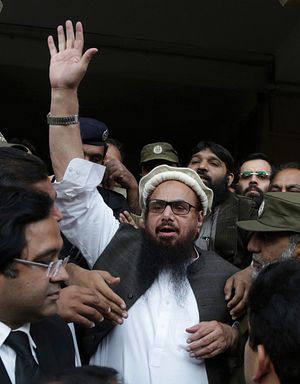It might still be premature to read too much into former military dictator Gen (R) Pervez Musharraf talking about a political alliance with the Lashkar-e-Taiba (LeT) and its offshoot Jamaat-ud-Dawa (JuD). Not because these groups are officially banned in Pakistan, but because Musharraf is a largely irrelevant political entity these days.
However, events of recent weeks suggest that the unlikely merger of the Musharraf-led “grand alliance of 23 political parties” with the Hafiz Saeed-led proscribed groups would perfectly symbolize the mullah-military takeover of Pakistan.
Four days before the state surrendered to radical Islamist thugs in the capital, the Lahore High Court review board refused to extend Saeed’s 10-month detention period owing to “lack of evidence.” Saeed’s release, coupled with the civil-military leadership kowtowing to a radical Islamist group that has already contested two by-elections in the country, is the formal completion of the political mainstreaming of jihadists in Pakistan.
This mainstreaming has not only been planned by the military leadership, it has also been pushed by them, resulting in the Dawn Leaks episode last year, from which the civilian government never managed to recover.
On cue, the JuD’s first statements following Saeed’s release was accusing the government of “taking orders from India” to further delegitimize the civilian leaders as “anti-national.” Fittingly, Saeed also confirmed that he will be taking part in the 2018 elections under the banner of the Milli Muslim League (MML) – the latest LeT/JuD offshoot, which is yet to be registered by the Election Commission of Pakistan.
The military’s support to the Tehrik Labbaik Ya Rasool Allah (TLY) protesters was epitomized by the video of the DG Rangers handing out cash coupons to those prisoners released as per agreement with the state.
For the military establishment, bolstering these Islamist groups not only dents the vote bank of the ruling Pakistan Muslim League-Nawaz (PML-N), which 12 months ago was the overwhelming favourite to win the 2018 elections with an even bigger majority. Giving formal political shape to the decades-old mullah-military nexus also further aids the military’s strategic interests in Afghanistan and Kashmir.
This is where Musharraf joining hands with Hafiz Saeed to represent a mega coalition of Islamists and the fringe parties that he already has on board would carry symbolic value, if nothing else.
The ongoing treason trial against Musharraf, which the former army chief escaped from, was among the first sources of conflict after PML-N took over in 2013. Musharraf has further been declared an absconder in the murder case of former Prime Minister Benazir Bhutto. And so for a former army chief, who has been sanctioned as an absconder in cases pertaining to breaching the Constitution and killing a former elected prime minister, to return to Pakistan and head a political coalition would complete civilian subjugation to the Army.
Tahir-ul-Qadri’s Pakistan Awami Tehrik (PAT) is among the parties that are a part of Musharraf’s coalition. PAT had joined the Pakistan Tehrik-e-Insaf (PTI) in 2014 to demand then-Prime Minister Nawaz Sharif’s resignation in a four month long protest in the capital – a plot backed by a section of the military establishment.
Qadri is now in Lahore, plotting the overthrowing of the Punjab government, which has been targeted by a damning report of the leaders’ involvement in the 2014 Model Town killings.
Even so, Musharraf’s coalition, even if it takes MML on board, or the potential resumption of the Muttahida Majlis-e-Amal (MMA) – an alliance of nationwide Islamist parties – would do little in terms of electoral damage, let alone have a chance of forming the government following next year’s elections.
That means that the military establishment’s main player would remain the PTI and its chief Imran Khan, who have not only gone toe-to-toe with the PML-N in by-elections over the past four years, but have gained the most from the PML-N’s losses in recent months.
And so, what the military leadership is ideally looking at is a PTI government with perhaps a Musharraf and/or Saeed-led coalition a part of the opposition – just to rub in who’s actually in charge, if nothing else.

































